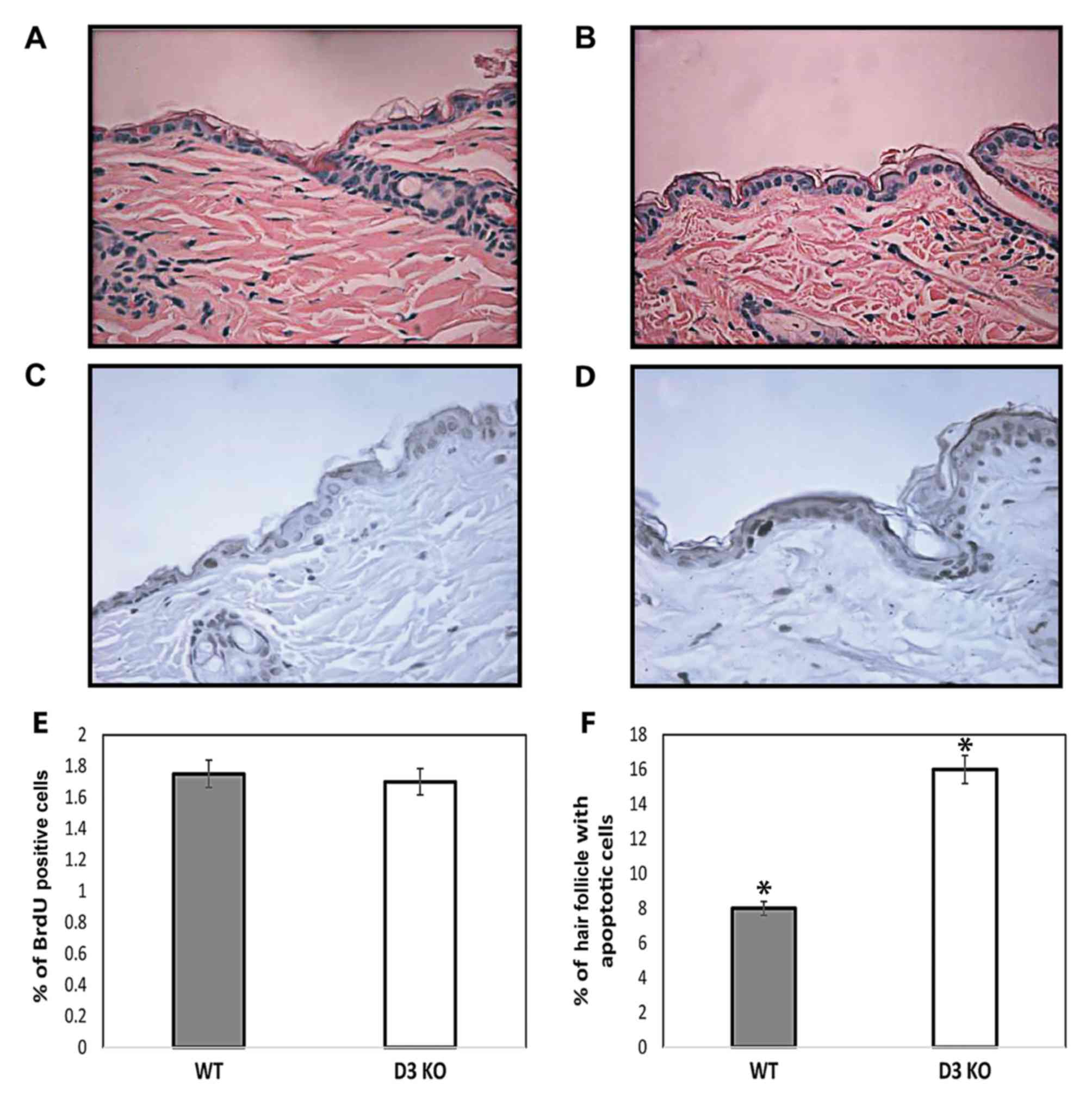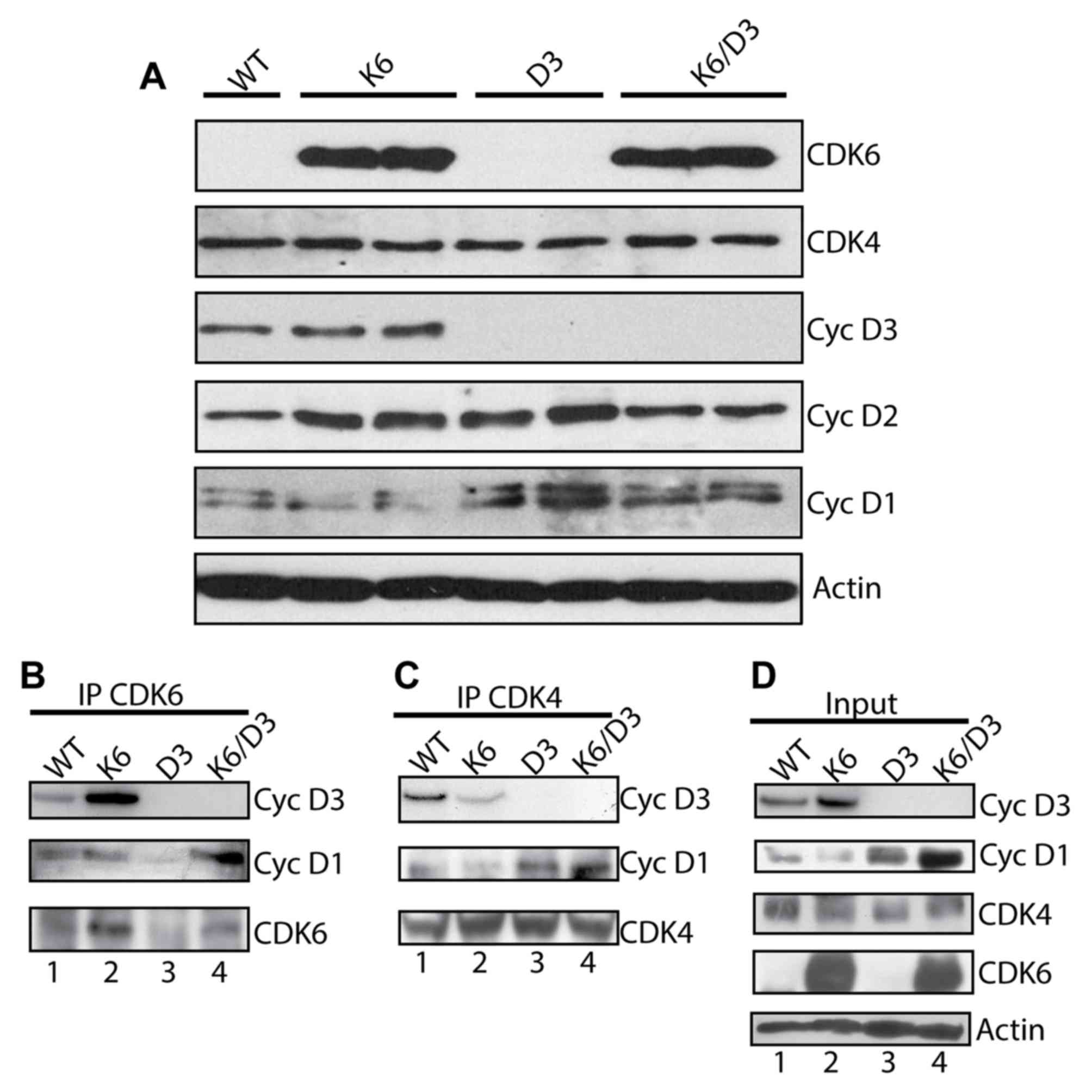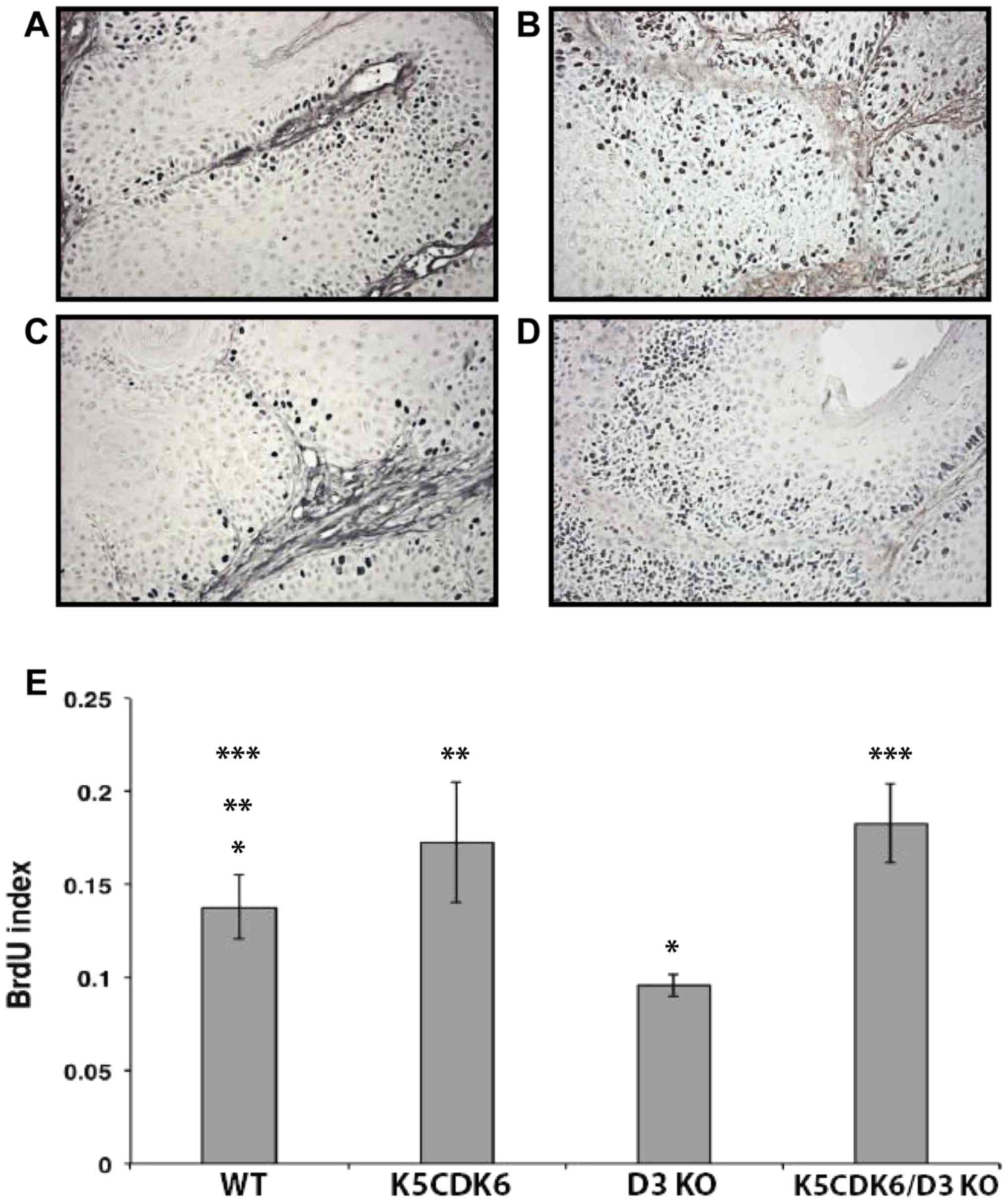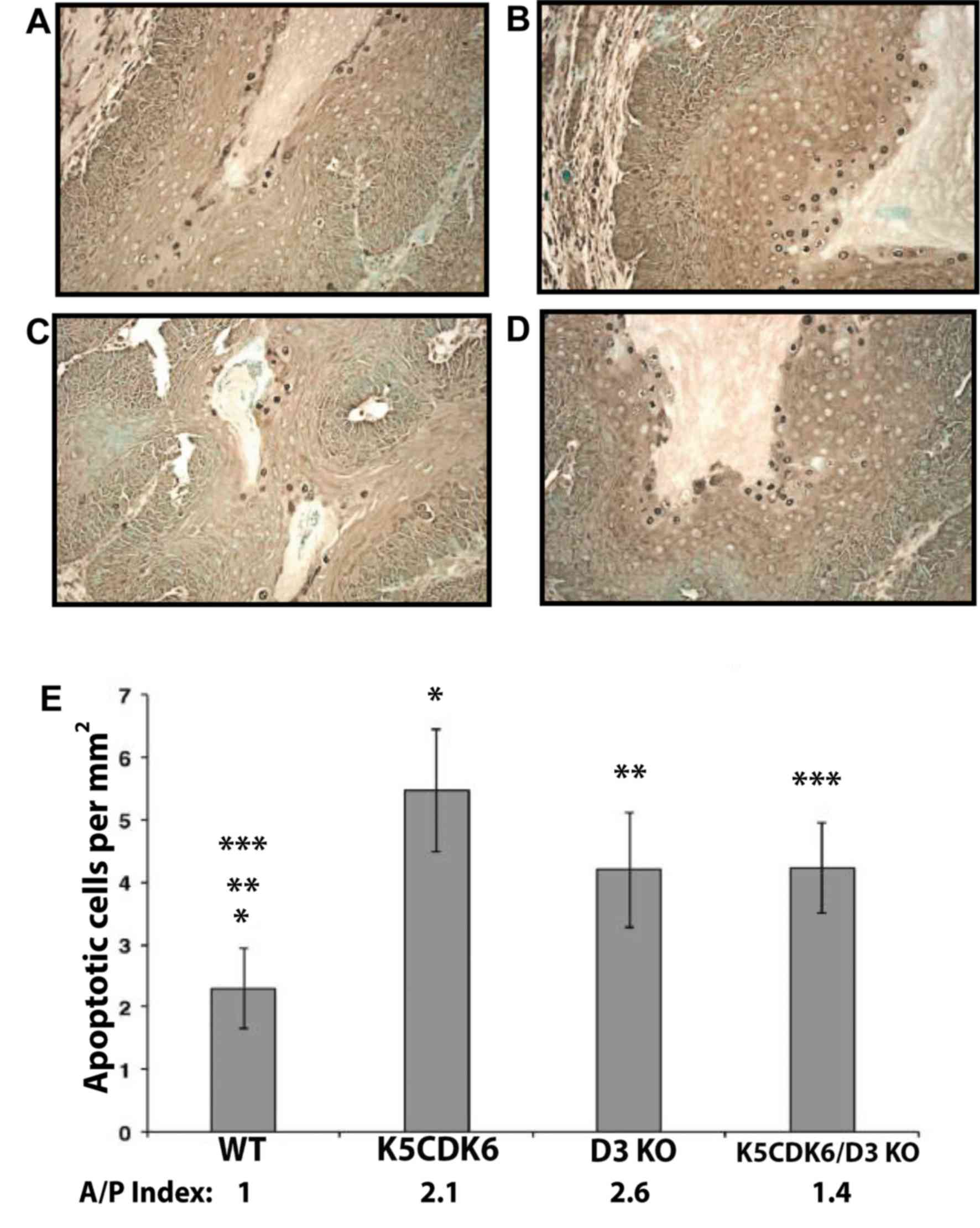|
1
|
Sherr CJ: D-type cyclins. Trends Biochem
Sci. 20:187–190. 1995. View Article : Google Scholar : PubMed/NCBI
|
|
2
|
Weinberg RA: The retinoblastoma protein
and cell cycle control. Cell. 81:323–330. 1995. View Article : Google Scholar : PubMed/NCBI
|
|
3
|
Farkas T, Hansen K, Holm K, Lukas J and
Bartek J: Distinct phosphorylation events regulate p130- and
p107-mediated repression of E2F-4. J Biol Chem. 277:26741–26752.
2002. View Article : Google Scholar : PubMed/NCBI
|
|
4
|
Leng X, Noble M, Adams PD, Qin J and
Harper JW: Reversal of growth suppression by p107 via direct
phosphorylation by cyclin D1/cyclin-dependent kinase 4. Mol Cell
Biol. 22:2242–2254. 2002. View Article : Google Scholar : PubMed/NCBI
|
|
5
|
Meyerson M and Harlow E: Identification of
G1 kinase activity for cdk6, a novel cyclin D partner. Mol Cell
Biol. 14:2077–2086. 1994. View Article : Google Scholar : PubMed/NCBI
|
|
6
|
Sherr CJ and Roberts JM: CDK inhibitors:
Positive and negative regulators of G1-phase progression. Genes
Dev. 13:1501–1512. 1999. View Article : Google Scholar : PubMed/NCBI
|
|
7
|
Blain SW, Montalvo E and Massague J:
Differential interaction of the cyclin-dependent kinase (Cdk)
inhibitor p27Kip1 with cyclin A-Cdk2 and cyclin D2-Cdk4. J Biol
Chem. 272:25863–25872. 1997. View Article : Google Scholar : PubMed/NCBI
|
|
8
|
Sherr CJ and McCormick F: The RB and p53
pathways in cancer. Cancer Cell. 2:103–112. 2002. View Article : Google Scholar : PubMed/NCBI
|
|
9
|
Ciemerych MA, Kenney AM, Sicinska E,
Kalaszczynska I, Bronson RT, Rowitch DH, Gardner H and Sicinski P:
Development of mice expressing a single D-type cyclin. Genes Dev.
16:3277–3289. 2002. View Article : Google Scholar : PubMed/NCBI
|
|
10
|
Cheung TH, Yu MM, Lo KW, Yim SF, Chung TK
and Wong YF: Alteration of cyclin D1 and CDK4 gene in carcinoma of
uterine cervix. Cancer Lett. 166:199–206. 2001. View Article : Google Scholar : PubMed/NCBI
|
|
11
|
Dickson C, Fantl V, Gillett C, Brookes S,
Bartek J, Smith R, Fisher C, Barnes D and Peters G: Amplification
of chromosome band 11q13 and a role for cyclin D1 in human breast
cancer. Cancer Lett. 90:43–50. 1995. View Article : Google Scholar : PubMed/NCBI
|
|
12
|
Fujii M, Ishiguro R, Yamashita T and
Tashiro M: Cyclin D1 amplification correlates with early recurrence
of squamous cell carcinoma of the tongue. Cancer Lett. 172:187–192.
2001. View Article : Google Scholar : PubMed/NCBI
|
|
13
|
Houldsworth J, Reuter V, Bosl GJ and
Chaganti RS: Aberrant expression of cyclin D2 is an early event in
human male germ cell tumorigenesis. Cell Growth Differ. 8:293–299.
1997.PubMed/NCBI
|
|
14
|
Sicinski P, Donaher JL, Geng Y, Parker SB,
Gardner H, Park MY, Robker RL, Richards JS, McGinnis LK, Biggers
JD, et al: Cyclin D2 is an FSH-responsive gene involved in gonadal
cell proliferation and oncogenesis. Nature. 384:470–474. 1996.
View Article : Google Scholar : PubMed/NCBI
|
|
15
|
Delmer A, Ajchenbaum-Cymbalista F, Tang R,
Ramond S, Faussat AM, Marie JP and Zittoun R: Overexpression of
cyclin D2 in chronic B-cell malignancies. Blood. 85:2870–2876.
1995.PubMed/NCBI
|
|
16
|
Hedberg Y, Roos G, Ljungberg B and
Landberg G: Cyclin D3 protein content in human renal cell carcinoma
in relation to cyclin D1 and clinico-pathological parameters. Acta
Oncol. 41:175–181. 2002. View Article : Google Scholar : PubMed/NCBI
|
|
17
|
Ito Y, Takeda T, Wakasa K, Tsujimoto M and
Matsuura N: Expression and possible role of cyclin D3 in human
pancreatic adenocarcinoma. Anticancer Res. 21:1043–1048.
2001.PubMed/NCBI
|
|
18
|
Pruneri G, Pignataro L, Valentini S,
Fabris S, Maisonneuve P, Carboni N, Pece S, Capra M, Del Curto B,
Neri A and Viale G: Cyclin D3 immunoreactivity is an independent
predictor of survival in laryngeal squamous cell carcinoma. Clin
Cancer Res. 11:242–248. 2005.PubMed/NCBI
|
|
19
|
Wong SC, Chan JK, Lee KC and Hsiao WL:
Differential expression of p16/p21/p27 and cyclin D1/D3, and their
relationships to cell proliferation, apoptosis, and tumour
progression in invasive ductal carcinoma of the breast. J Pathol.
194:35–42. 2001. View Article : Google Scholar : PubMed/NCBI
|
|
20
|
Filipits M, Jaeger U, Pohl G, Stranzl T,
Simonitsch I, Kaider A, Skrabs C and Pirker R: Cyclin D3 is a
predictive and prognostic factor in diffuse large B-cell lymphoma.
Clin Cancer Res. 8:729–733. 2002.PubMed/NCBI
|
|
21
|
Sicinska E, Aifantis I, Le Cam L, Swat W,
Borowski C, Yu Q, Ferrando AA, Levin SD, Geng Y, von Boehmer H and
Sicinski P: Requirement for cyclin D3 in lymphocyte development and
T cell leukemias. Cancer Cell. 4:451–461. 2003. View Article : Google Scholar : PubMed/NCBI
|
|
22
|
Rodriguez-Puebla ML, LaCava M and Conti C:
Cyclin d1 overexpression in mouse epidermis increases
cyclin-dependent kinase activity and cell proliferation in vivo but
does not affect skin tumor development. Cell Growth Differ.
10:467–472. 1999.PubMed/NCBI
|
|
23
|
Rodriguez-Puebla ML, LaCava M,
Gimenez-Conti IB, Jonhson DG and Conti CJ: Deregulated expression
of cell-cycle proteins during premalignant progression in SENCAR
mouse skin. Oncogene. 17:2251–2258. 1998. View Article : Google Scholar : PubMed/NCBI
|
|
24
|
Rodriguez-Puebla ML, de Miliani Marval PL,
LaCava M, Moons DS, Kiyokawa H and Conti CJ: Cdk4 deficiency
inhibits skin tumor development but does not affect keratinocyte
proliferation. Am J Pathol. 161:405–411. 2002. View Article : Google Scholar : PubMed/NCBI
|
|
25
|
de Miliani Marval PL, Macias E, Conti CJ
and Rodriguez-Puebla ML: Enhanced malignant tumorigenesis in Cdk4
transgenic mice. Oncogene. 23:1863–1873. 2004. View Article : Google Scholar : PubMed/NCBI
|
|
26
|
Zhang SY, Liu SC, Goodrow T, Morris R and
Klein-Szanto AJ: Increased expression of G1 cyclins and
cyclin-dependent kinases during tumor progression of chemically
induced mouse skin neoplasms. Mol Carcinog. 18:142–152. 1997.
View Article : Google Scholar : PubMed/NCBI
|
|
27
|
Rodriguez-Puebla ML, Robles AI, Johnson
DG, LaCava M and Conti CJ: Synchronized proliferation induced by
12-O-tetradecanoylphorbol-13-acetate treatment of mouse skin: An in
vivo model for cell cycle regulation. Cell Growth Differ. 9:31–39.
1998.PubMed/NCBI
|
|
28
|
Robles AI, Rodriguez-Puebla ML, Glick AB,
Trempus C, Hansen L, Sicinski P, Tennant RW, Weinberg RA, Yuspa SH
and Conti CJ: Reduced skin tumor development in cyclin D1-deficient
mice highlights the oncogenic ras pathway in vivo. Genes Dev.
12:2469–2474. 1998. View Article : Google Scholar : PubMed/NCBI
|
|
29
|
Rojas P, Cadenas MB, Lin PC, Benavides F,
Conti CJ and Rodriguez-Puebla ML: Cyclin D2 and cyclin D3 play
opposite roles in mouse skin carcinogenesis. Oncogene.
26:1723–1730. 2007. View Article : Google Scholar : PubMed/NCBI
|
|
30
|
Rodriguez-Puebla ML, LaCava M and Conti
CJ: Cyclin D1 overexpression in mouse epidermis increases
cyclin-dependent kinase activity and cell proliferation in vivo but
does not affect skin tumor development. Cell Growth Differ.
10:467–472. 1999.PubMed/NCBI
|
|
31
|
Rodriguez-Puebla ML, Robles AI and Conti
CJ: ras activity and cyclin D1 expression: An essential mechanism
of mouse skin tumor development. Mol Carcinog. 24:1–6. 1999.
View Article : Google Scholar : PubMed/NCBI
|
|
32
|
Rodriguez-Puebla ML, de Miliani Marval PL,
LaCava M, Moons DS, Kiyokawa H and Conti CJ: Cdk4 deficiency
inhibits skin tumor development but does not affect normal
keratinocyte proliferation. Am J Pathol. 161:405–411. 2002.
View Article : Google Scholar : PubMed/NCBI
|
|
33
|
Macias E, Kim Y, de Miliani Marval PL,
Klein-Szanto A and Rodriguez-Puebla ML: Cdk2 deficiency decreases
ras/CDK4-dependent malignant progression, but not myc-induced
tumorigenesis. Cancer Res. 67:9713–9720. 2007. View Article : Google Scholar : PubMed/NCBI
|
|
34
|
Sistrunk C, Kim SH, Wang X, Lee SH, Kim Y,
Macias E and Rodriguez-Puebla ML: Skp2 deficiency inhibits chemical
skin tumorigenesis independent of p27(Kip1) accumulation. Am J
Pathol. 182:1854–1864. 2013. View Article : Google Scholar : PubMed/NCBI
|
|
35
|
Wang X, Sistrunk C, de Miliani Marval PL,
Kim Y and Rodriguez-Puebla ML: Combined effect of cyclin D3
expression and abrogation of cyclin D1 prevent mouse skin tumor
development. Cell Cycle. 11:335–342. 2012. View Article : Google Scholar : PubMed/NCBI
|
|
36
|
Wang X, Sistrunk C and Rodriguez-Puebla
ML: Unexpected reduction of skin tumorigenesis on expression of
cyclin-dependent kinase 6 in mouse epidermis. Am J Pathol.
178:345–354. 2011. View Article : Google Scholar : PubMed/NCBI
|
|
37
|
Philipp J, Vo K, Gurley KE, Seidel K and
Kemp CJ: Tumor suppression by p27Kip1 and p21Cip1 during chemically
induced skin carcinogenesis. Oncogene. 18:4689–4698. 1999.
View Article : Google Scholar : PubMed/NCBI
|
|
38
|
Kemp CJ, Donehower LA, Bradley A and
Balmain A: Reduction of p53 gene dosage does not increase
initiation or promotion but enhances malignant progression of
chemically induced skin tumors. Cell. 74:813–822. 1993. View Article : Google Scholar : PubMed/NCBI
|
|
39
|
Ise K, Nakamura K, Nakao K, Shimizu S,
Harada H, Ichise T, Miyoshi J, Gondo Y, Ishikawa T, Aiba A and
Katsuki M: Targeted deletion of the H-ras gene decreases tumor
formation in mouse skin carcinogenesis. Oncogene. 19:2951–2956.
2000. View Article : Google Scholar : PubMed/NCBI
|
|
40
|
Ruiz S, Santos M, Lara MF, Segrelles C,
Ballestín C and Paramio JM: Unexpected roles for pRb in mouse skin
carcinogenesis. Cancer Res. 65:9678–9686. 2005. View Article : Google Scholar : PubMed/NCBI
|
|
41
|
Ruiz S, Santos M and Paramio JM: Is the
loss of pRb essential for the mouse skin carcinogenesis? Cell
Cycle. 5:625–629. 2006. View Article : Google Scholar : PubMed/NCBI
|
|
42
|
Rojas P, Benavides F, Blando J, Perez C,
Cardenas K, Richie E, Knudsen ES, Johnson DG, Senderowicz AM,
Rodriguez-Puebla ML and Conti CJ: Enhanced skin carcinogenesis and
lack of thymus hyperplasia in transgenic mice expressing human
cyclin D1b (CCND1b). Mol Carcinog. 48:508–516. 2009. View Article : Google Scholar : PubMed/NCBI
|
|
43
|
Rounbehler RJ, Schneider-Broussard R,
Conti CJ and Johnson DG: Myc lacks E2F1′s ability to suppress skin
carcinogenesis. Oncogene. 20:5341–5349. 2001. View Article : Google Scholar : PubMed/NCBI
|
|
44
|
Macias E, de Miliani Marval PL, De Siervi
A, Conti CJ, Senderowicz AM and Rodriguez-Puebla ML: CDK2
activation in mouse epidermis induces keratinocyte proliferation
but does not affect skin tumor development. Am J Pathol.
173:526–535. 2008. View Article : Google Scholar : PubMed/NCBI
|
|
45
|
Ito M, Liu Y, Yang Z, Nguyen J, Liang F,
Morris RJ and Cotsarelis G: Stem cells in the hair follicle bulge
contribute to wound repair but not to homeostasis of the epidermis.
Nat Med. 11:1351–1354. 2005. View
Article : Google Scholar : PubMed/NCBI
|
|
46
|
Wang P, Pavletic ZS and Joshi SS:
Increased apoptosis in B-chronic lymphocytic leukemia cells as a
result of cyclin D3 down regulation. Leuk Lymphoma. 43:1827–1835.
2002. View Article : Google Scholar : PubMed/NCBI
|
|
47
|
Morris RJ, Fischer SM and Slaga TJ:
Evidence that a slowly cycling subpopulation of adult murine
epidermal cells retains carcinogen. Cancer Res. 46:3061–3066.
1986.PubMed/NCBI
|
|
48
|
Lapouge G, Youssef KK, Vokaer B, Achouri
Y, Michaux C, Sotiropoulou PA and Blanpain C: Identifying the
cellular origin of squamous skin tumors. Proc Natl Acad Sci USA.
108:7431–7436. 2011. View Article : Google Scholar : PubMed/NCBI
|
|
49
|
Rodriguez-Puebla ML, LaCava M,
Gimenez-Conti IB, Johnson DG and Conti CJ: Deregulated expression
of cell-cycle proteins during premalignant progression in SENCAR
mouse skin. Oncogene. 17:2251–2258. 1998. View Article : Google Scholar : PubMed/NCBI
|
|
50
|
Rodriguez-Puebla ML, LaCava M, De Miliani
Marval PL, Jorcano JL, Richie ER and Conti CJ: Cyclin D2
overexpression in transgenic mice induces thymic and epidermal
hyperplasia whereas cyclin D3 expression results only in epidermal
hyperplasia. Am J Pathol. 157:1039–1050. 2000. View Article : Google Scholar : PubMed/NCBI
|
|
51
|
Ito K, Maruyama Z, Sakai A, Izumi S,
Moriishi T, Yoshida CA, Miyazaki T, Komori H, Takada K, Kawaguchi H
and Komori T: Overexpression of Cdk6 and Ccnd1 in chondrocytes
inhibited chondrocyte maturation and caused p53-dependent apoptosis
without enhancing proliferation. Oncogene. 33:1862–1871. 2014.
View Article : Google Scholar : PubMed/NCBI
|
|
52
|
Yamamoto H, Ochiya T, Takeshita F,
Toriyama-Baba H, Hirai K, Sasaki H, Sasaki H, Sakamoto H, Yoshida
T, Saito I and Terada M: Enhanced skin carcinogenesis in cyclin
D1-conditional transgenic mice: Cyclin D1 alters keratinocyte
response to calcium-induced terminal differentiation. Cancer Res.
62:1641–1647. 2002.PubMed/NCBI
|
|
53
|
Robles AI, Larcher F, Whalin RB, Murillas
R, Richie E, Gimenez-Conti IB, Jorcano JL and Conti CJ: Expression
of Cyclin D1 in epithelial tissues of transgenic mice results in
epidermal hyperproliferation and severe thymic hyperplasia. Proc
Natl Acad Sci USA. 93:7634–7638. 1996. View Article : Google Scholar
|
|
54
|
Morris RJ, Tryson KA and Wu KQ: Evidence
that the epidermal targets of carcinogen action are found in the
interfollicular epidermis of infundibulum as well as in the hair
follicles. Cancer Res. 60:226–229. 2000.PubMed/NCBI
|
|
55
|
Morris RJ, Liu Y, Marles L, Yang Z,
Trempus C, Li S, Lin JS, Sawicki JA and Cotsarelis G: Capturing and
profiling adult hair follicle stem cells. Nat Biotechnol.
22:411–417. 2004. View
Article : Google Scholar : PubMed/NCBI
|
|
56
|
Morris RJ: A perspective on keratinocyte
stem cells as targets for skin carcinogenesis. Differentiation.
72:381–386. 2004. View Article : Google Scholar : PubMed/NCBI
|
|
57
|
Kangsamaksin T, Park HJ, Trempus CS and
Morris RJ: A perspective on murine keratinocyte stem cells as
targets of chemically induced skin cancer. Mol Carcinog.
46:579–584. 2007. View Article : Google Scholar : PubMed/NCBI
|
|
58
|
Slaga T: Mechanism involved in two-stage
carcinogenesis in mouse skinMechanism of Tumor Promotion. Slaga T:
CRC Press; Boca Raton: pp. 1–16. 1984
|
|
59
|
Kollmann K, Heller G, Schneckenleithner C,
Warsch W, Scheicher R, Ott RG, Schäfer M, Fajmann S, Schlederer M,
Schiefer AI, et al: A Kinase-Independent Function of CDK6 Links the
Cell Cycle to Tumor Angiogenesis. Cancer Cell. 24:167–181. 2013.
View Article : Google Scholar : PubMed/NCBI
|
|
60
|
Hydbring P, Malumbres M and Sicinski P:
Non-canonical functions of cell cycle cyclins and cyclin-dependent
kinases. Nat Rev Mol Cell Biol. 17:280–292. 2016. View Article : Google Scholar : PubMed/NCBI
|
|
61
|
Pestell RG: New roles of cyclin D1. Am J
Pathol. 183:3–9. 2013. View Article : Google Scholar : PubMed/NCBI
|
|
62
|
Peterson LF, Boyapati A, Ranganathan V,
Iwama A, Tenen DG, Tsai S and Zhang DE: The hematopoietic
transcription factor AML1 (RUNX1) is negatively regulated by the
cell cycle protein cyclin D3. Mol Cell Biol. 25:10205–10219. 2005.
View Article : Google Scholar : PubMed/NCBI
|
|
63
|
Hoi CS, Lee SE, Lu SY, McDermitt DJ,
Osorio KM, Piskun CM, Peters RM, Paus R and Tumbar T: Runx1
directly promotes proliferation of hair follicle stem cells and
epithelial tumor formation in mouse skin. Mol Cell Biol.
30:2518–2536. 2010. View Article : Google Scholar : PubMed/NCBI
|




















